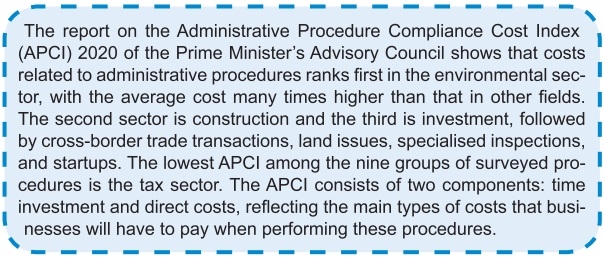Tightening up the nation’s lawmaking for business
After the government’s reform efforts for the business and investment environment, how do you assess the impact of these procedures on business today?
 |
| Phan Duc Hieu, member of the National Assembly’s Economic Committee |
Regulations are a tool of every state to perform economic and social management. Reasonable legal regulations and administrative procedures not only contribute to protecting the common interests of society but also promote healthy competition and the development of industries.
In contrast, unreasonable and unnecessary regulations are likely to cause many adverse impacts on businesses. The most obvious is creating compliance costs, increasing business costs, reducing competitiveness, and restricting competition if it causes barriers to market entry. Other examples include increasing disproportionate impacts on businesses small and medium-sized enterprises, business risks, and loss of business opportunities. As for the cost of administrative compliance, there have been many studies signifying that these can be enormous.
How could one law amending many laws resolve the conflicts that exist between them, as well as related unnecessary procedures that are increasing costs?
The government has strongly improved the business environment, simplified administrative procedures, cut costs, and improved overall competitiveness.
This is a good opportunity to address legal barriers that are an inconsistency or cause conflicts between laws. At the same time, as the economy and business activities are stalled, it is the right time to implement institutional reform. If done well, it will create room for economic recovery and development later.
However, as we are drastically improving the institutional system, it is difficult to completely avoid problems, and not every of these can be solved at once. Institutional reform should also be seen as an ongoing process. The improvement of the institution by applying one law amending many laws is a good and effective way to solve institutional problems. This approach – along with several other ways proposed by the government, such as unifying the guidance of the law – will help reduce the problem of legal conflicts in the future.
Companies have been asking for help in doing business for some time. How can the government balance their needs with those of the general public and the macroeconomy?
Determining the optimal balance between state interventions for the benefit of society and the interests of enterprises is not easy when developing and drafting legal regulations.
However, loosening the state management is sometimes necessary and the responsibility of officials. The essence of reform is not to abandon state management but to replace the traditional state management tools with new methods that are more effective and less costly for businesses, while still achieving the goals. However, this innovation in thinking and institutional building methods cannot progress hastily and thus takes to be fully realised. The regulatory system’s quality control mechanism may not be effective. Because of this, many countries have set up a specialised agency for institutional reform under the government, such as in South Korea, Japan, the United Kingdom, and the United States.
Which inconsistencies between laws are most difficult to amend?
In general, contradictions and incompatibilities between laws are the most difficult due to the complex nature of these. To solve this, it requires close cooperation and coordination of many relevant ministries and branches. Some ministries have to increase their efforts and work, and it is necessary to change the existing supervision and management process.
Moreover, it is difficult to assign an agency to act as a focal point on advising on such problems. Laws are often drafted according to the scope of sectors and fields under one ministry or sector, leading to a dispersement in management. Meanwhile, business activity is simultaneously subject to many different regulations.
Further, regulations are enacted at different points in time, so there is a chance that when a law or regulation is changed or enacted, this risk may be present. Thus, contradictions and incompatibilities are always at risk of arising and sometimes difficult to detect when drafting a new regulation. In the long term, there should be a mechanism to strengthen coordination among agencies in lawmaking.
How can the government tackle the issue of rendering law amendments suitable to the actual, rapidly changing market?
This problem is becoming more challenging for many countries. As society develop rapidly amid the current Industry 4.0 and unexpected events like the pandemic, there are now many opinions that differ from each other. Future legal institutions should be flexible and dynamic. In addition, some business principles previously taken for granted may have to be changed, such as only intervening when necessary, applying the sandbox mechanism only in certain industries and fields, and promoting self-regulation instead of state regulation.
Therefore, we should not be afraid to review and evaluate the legal system in a timely manner, and should even consider establishing an effective system to carry out changes that were inquired by the business community – who has the best and most up-to-date information on changes in the market and is also subject to the application of the law. In the long term, there needs to be a change in thinking and appropriate institutional building tools.
 |
What the stars mean:
★ Poor ★ ★ Promising ★★★ Good ★★★★ Very good ★★★★★ Exceptional
Latest News
More News
- NAB Innovation Centre underscores Vietnam’s appeal for tech investment (January 30, 2026 | 11:16)
- Vietnam moves towards market-based fuel management with E10 rollout (January 30, 2026 | 11:10)
- Vietnam startup funding enters a period of capital reset (January 30, 2026 | 11:06)
- Vietnam strengthens public debt management with World Bank and IMF (January 30, 2026 | 11:00)
- PM inspects APEC 2027 project progress in An Giang province (January 29, 2026 | 09:00)
- Vietnam among the world’s top 15 trading nations (January 28, 2026 | 17:12)
- Vietnam accelerates preparations for arbitration centre linked to new financial hub (January 28, 2026 | 17:09)
- Vietnam's IPO market on recovery trajectory (January 28, 2026 | 17:04)
- Digital economy takes centre stage in Vietnam’s new growth model (January 28, 2026 | 11:43)
- EU Council president to visit Vietnam amid partnership upgrade (January 28, 2026 | 11:00)

 Tag:
Tag:














 Mobile Version
Mobile Version